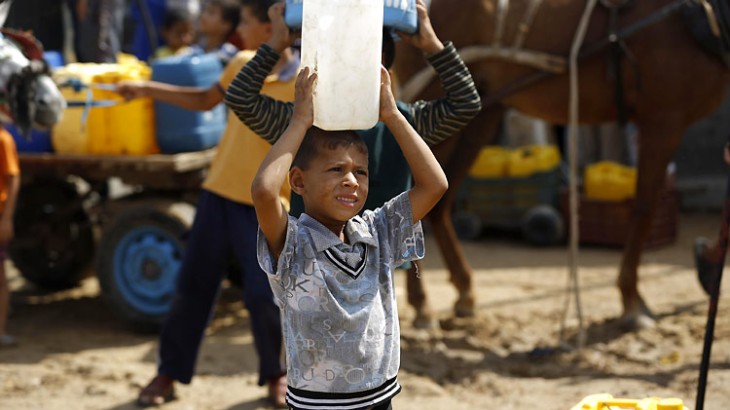Gaza: Damaged water and sewage systems pose health danger

Large segments of the population of the Gaza Strip are still deprived of safe drinking water. Repairs to sewage systems and the restoration of basic electricity services remain urgent.
Water and power facilities in Gaza were already at breaking point before the recent conflict, which further damaged the sewage network as well as the territory's only power plant.
Destroyed sewage systems not only sent wastewater flooding into the clean-water networks but also into the environment, worsening the risks to public health. This aggravated an already serious situation resulting from the fact that the Strip had previously been discharging nearly 100,000 cubic metres of wastewater into the sea every day.
Emergency efforts carried out by the ICRC have so far provided water for over 600,000 people – at least one third of the population – and helped restore over 80 per cent of the limited electricity service for inhabitants. More sustainable improvements in vital infrastructure are needed, however.
The vital water-electricity equation
"The equation is simple," said Guillaume Pierrehumbert, the ICRC's water and habitat coordinator for the Gaza Strip. "The shortage of electricity prevents water from being cleaned, evacuated, treated, desalinated and restored to homes, hospitals and businesses. There is an overall lack of water, and the water that is available is salty, dirty or dangerous to drink."
Generators are therefore needed as a back-up to perform simple daily activities. These require extra fuel – a scarce commodity in Gaza, where financial resources are limited.
"Just imagine how the water system in this densely populated urban area has been maimed," said Mr Pierrehumbert. "The effects are seen, smelled and felt everywhere, but are most worrying in hospitals where the safety of people who are in greatest need is jeopardized."
Critical services still at risk
Some critical services in hospitals require a permanent power supply which can only be provided by fuel-hungry generators. In addition, the poor quality of the water that is available – particularly its high salinity – is adversely affecting services such as haemodialysis which depend on pure water.
Great challenges persist. Areas such as Beit Hanoun (40,000 inhabitants) and Shujaya (35,000 inhabitants) are still exposed to health hazards and the strong stench of destroyed sewage systems. It is estimated that more than a year will be needed to restore the situation to pre-war levels.
"Renovation of basic infrastructure is urgent, and requires an effective coordination of human effort and material resources," explained Jacques de Maio, head of the ICRC delegation in Israel and the occupied territories. "Speeding up the import of materials is vital given the depleted stocks of crucial equipment and spare parts. In one of the world’s most densely populated areas, we cannot afford to take chances with public health."
Ever since the conflict erupted, the ICRC has been working closely with the Coastal Municipalities Water Utility, the Palestinian Water Authority, the Gaza Electricity Distribution Company, the Palestinian Energy and Natural Resources Authority and local municipalities to carry out the most urgent repairs to the water systems and the electricity network.
Life-saving efforts ongoing
Since the beginning of the crisis, in continuing cooperation with the Palestine Red Crescent Society, the ICRC has also:
- carried out life-saving activities, such as the transport of 3,000 blood units to Gaza and referrals of patients for treatment outside the Strip;
- provided emergency repairs and equipment, surgical supplies, drugs, medicines and materials for the treatment of war-wounded patients to hospitals and other health-care facilities, ambulance services, and Gaza's Artificial Limb and Polio Centre;
- made available medical personnel with expertise in physical rehabilitation and mental health;
- started repairs in four of the most heavily damaged hospitals in the Gaza Strip;
- given over 131,000 people displaced by the conflict items such as shelter materials, bedding, cooking equipment, hygiene products, diapers, buckets, jerrycans, cleaning products and, in some cases, water and food;
- collected information on the conduct of the hostilities in and around the Gaza Strip, and maintained bilateral and confidential dialogue with the parties to the conflict;
- continued to visit and assist detainees;
- processed 68 tracing requests concerning individuals from Gaza;
- delivered over 1,000 family messages to Gaza detainees;
- donated 100 body bags, 100 protective uniforms and items for handling human remains;
- provided hospitals with 100,000 litres of fuel;
- delivered over 1,800 palettes of water, food, hygiene items and ambulance spare parts.
For further information, please contact:
Marco Jimenez, ICRC Gaza, tel: +972 59 893 5466 (English, French, Spanish)
Misada Saif, ICRC Gaza, tel: +972 59 960 7538 (English, Arabic)
Cecilia Goin, ICRC Jerusalem, tel: +972 52 601 9148
Photo credit : CC BY-NC-ND / ICRC






